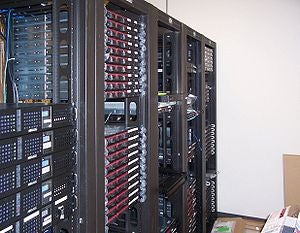
Image via Wikipedia
Cisco’s big next-generation Unified Computing System announcement, which came with a host of news about new servers and switches and high-performing memory technology, was greeted with skepticism by other companies looking to dominate the data center architecture space, including Dell, which partners with companies such as Brocade rather than offer its own Dell-branded switches.
But that’s a good thing, claims Dell.
“Today’s announcement by Cisco demonstrates the bifurcation in the market with some vendors pushing a closed and propriety approach to the data center and Dell’s differentiated approach of delivering choice and solutions that are open, capable and affordable,” said Dell’s VP and GM for Server Platforms, Forrest Norrod, in a statement.
“We’ve heard loud and clear customers are looking to reap the benefits of virtualization and reduce data center complexity but not at the expense of handing their infrastructure over to a single vendor as Cisco is asking them to do.”
Dell has a point. Once you are locked in with a single vendor, you are at that vendor’s mercy in terms of upgrades, technology improvements and services. Isn’t that part of why everyone abandoned the vertically aligned vendors such as Unisys and Digital Equipment Corp. in favor of client/server architectures where it was easier to pick best-of-breed technology?
But Dell may not be without its own Dell-branded networking technology for long. One Dell channel executive recently told Channel Insider that the company could indeed be introducing its own networking products. The comment led to speculation that Dell could very well be in the market to buy a networking company of its own, and further speculation about likely targets.
If that happens, Dell may have to change its tune when it comes to the dangers of customers “handing their infrastructure over to a single vendor.”
In any case, do you or your customers have a preference? Is it best-of-breed or a single-vendor, integrated solution for you and yours?

![Reblog this post [with Zemanta]](http://img.zemanta.com/reblog_e.png?x-id=bdbffaee-6d83-462d-95a5-8fc80454a50f)